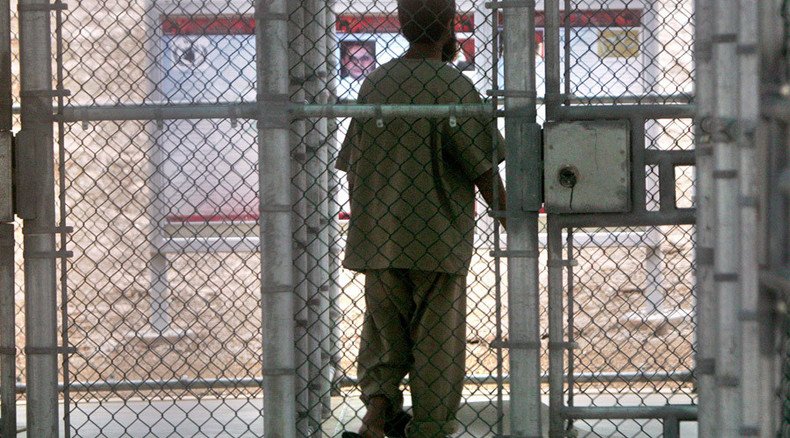Court rejects Obama admin. request to withhold Gitmo force-feeding videos from public

The Justice Department failed to persuade a federal judge to go back on her order to release videos of force-feeding at the Guantanamo Bay detention camp. Judge Gladys Kessler cited the public’s right to see the 32 videos in a strongly worded decision.
“Transparency about the actions of our government – including the judiciary – is one of the cornerstones of our democracy,” Judge Kessler of the US District Court of the District of Columbia wrote.
“This Court has found that the Government's justifications for barring the American public from seeing the videotapes are not sufficiently rational and plausible to justify barring release of the videotapes, which are part of the Court's official records, from the eyes and ears of the American public.”
Obama vetoes #NDAA over #Gitmo, budget workaround https://t.co/zqtr06T8Vlpic.twitter.com/T5akLkpbCL
— RT America (@RT_America) October 23, 2015The videos center around the plaintiff and former Guantanamo detainee Abu Wa'el Dhiab. Also known as Jihad Ahmed Mujstafa Diyab, Dhiab was captured in 2002 in Pakistan by local authorities, then passed on to US custody where he was held in Guantanamo without charges.
In 2007, the Syrian citizen of Lebanese origin refused food for the first time. Then in 2013, Dhiab led a hunger strike that would grow to include more than half of Gitmo detainees. Cleared for transfer in 2009, Dhiab wouldn’t leave the prison until December 2014 when Uruguay agreed to take him in.
Judge Kessler quoted from a 1971 court case where Justice Potter Stewart explained why newspapers had a right to publish the Pentagon Papers, leaked by Daniel Ellsberg.
"In the absence of the governmental checks and balances present in other areas of our national life,” Stewart wrote, “the only effective restraint upon executive policy and power in the areas of national defense and international affairs may be in an enlightened citizenry -- in an informed and critical public opinion which alone can...protect the values of democratic government.”
Hunger-striking #Gitmo prisoner might get medical exam for potential release http://t.co/VM3o3ktn3hpic.twitter.com/KebfCDn47w
— RT America (@RT_America) October 16, 2015The videos, seen by lawyers on each side of the Abu Wa'el Dhiab v. Barack Obama case, purportedly show Dhiab being pulled from his cell and fed against his will by six guards in “riot squad” gear, according to Reprieve, the organization paying for Dhiab’s lawyer.
The forced feeding, considered torture by the UN Human Rights Commission, the International Red Cross and other organizations, consists of shoving a tube up the nose and down into the stomach while the subject is strapped to a special chair. Dhiab experienced this about 1,300 times. His lawyers say the excruciating procedure is gratuitous and not medically necessary, but instead is a form of punishment.
Kessler found the government and military’s reasons for keeping the videos hidden from the public “repetitive, speculative and extremely vague.” Kessler also used the word “unbelievable” in her nine-page opinion when addressing the argument that Dhiab’s “privacy would be invaded.”
On the contrary, Dhiab has very much been against keeping the videos private. In an October 2014 court filing, through his attorneys he wrote, “If the American people stand for freedom, they should watch these tapes. If they truly believe in human rights, they need to see these tapes.”
Nice to see @DanielEllsberg's Pentagon Papers and @nytimes v US get a shout out in today's #Gitmo tapes opinion pic.twitter.com/d7QhoJEHIn
— Cori Crider (@cori_crider) October 27, 2015The tapes were first ordered to be released in October 2014 after 16 news companies, including the Associated Press, ABC, the Guardian, and the New York Times, requested them from court records. The government appealed that order, but was denied in May.
Then in July officials made another attempt, requesting Kessler reconsider the decision out of national security fears of whipping up anti-US sentiment abroad as well as within the Gitmo facility. Kessler rebuked those claims, writing, “What the Government is really saying is that its classification system trumps the decisions of the federal courts as to the public's access to official court records; in other words, the Executive Branch (in this case, the Military) purports to be a law unto itself.”
Cori Crider, a Reprieve lawyer representing Guantanamo detainees, said in a press release, “The Obama administration has dragged its feet for over a year to stop the American press and public seeing a single frame of these tapes. We’re glad the judge has denied the government’s request for a blanket cover-up, but a lot of problems persist – we expect the government to appeal this to the Supreme Court to stop people seeing the truth.”
“Americans have a right to see what continues to be done in their name up to this day. The government should reduce its heavy-handed censorship of the footage, drop the appeals, and release the tapes immediately.”
The “heavy-handed censorship” which Crider refers to ostensibly protects the identities of the guards, but Reprieve lawyers say it goes too far in editing the audio to an “incomprehensible” degree. They have a motion pending to remove some of the government’s editing.
The Obama administration is expected to appeal Kessler’s video release order to the US Court of Appeals for the DC Circuit.
LISTEN MORE:












